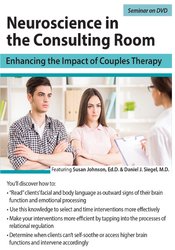

Understanding the neurobiology of the brain not only explains how change happens, it also translates into more effective psychotherapy. In this dynamic workshop, a psychotherapist and a neuropsychiatrist offer a dialogue demonstrating the relevance of neuroscience to the process of repairing couples’ relationships. Together, the presenters will review recorded couples therapy sessions to explore how neurobiological insights can inform and help shape a therapist’s moment-by-moment decision-making. You’ll discover how to:

Daniel J. Siegel, MD, is a graduate of Harvard Medical School and completed his postgraduate medical education at UCLA with training in pediatrics and child, adolescent, and adult psychiatry. He is currently a clinical professor of psychiatry at the UCLA School of Medicine, founding co-director of UCLA's Mindful Awareness Research Center, founding co-investigator at the UCLA Center for Culture, Brain and Development, and executive director of the Mindsight Institute, an educational center devoted to promoting insight, compassion, and empathy in individuals, families, institutions, and communities.
Dr. Siegel's psychotherapy practice spans thirty years, and he has published extensively for the professional audience. He serves as the Founding Editor for the Norton Professional Series on Interpersonal Neurobiology, which includes over 70 textbooks. Dr. Siegle's books include his five New York Times bestsellers: Aware: The Science and Practice of Presence; Brainstorm: The Power and Purpose of the Teenage Brain, Mind: A Journey to the Heart of Being Human, and two books with Tina Payne Bryson, PhD, The Whole-Brain Child and No-Drama Discipline. His other books include: The Power of Showing Up, also with Tina Payne Bryson, PhD, The Developing Mind, The Pocket Guide to Interpersonal Neurobiology, Mindsight, The Mindful Brain, The Mindful Therapist, Parenting from the Inside Out (with Mary Hartzell, MEd), and The Yes Brain (also with Tina Payne Bryson, PhD). He has been invited to lecture for the King of Thailand, Pope John Paul II, his Holiness the Dalai Lama, Google University, and TEDx.
Speaker Disclosures:
Financial: Dr. Dan Siegel is the medical director with Lifespan Learning Institute and is the executive director with Center for Human Development and Mindsight Institute, and the founding editor with Norton Series on Interpersonal Neurobiology. He has employment relationship with the University of Washington and UCLA School of Medicine. Dr. Siegel receives royalties as a published author. He receives a speaking honorarium and recording royalties from PESI, Inc. He has no relevant financial relationships with ineligible organizations.
Non-financial: Dr. Dan Siegel is an honorary member of the Austrian Federal Association for Mindfulness and serves on the Garrison Institute Board. He is an advisory board member with Gloo, Blue School, and Convergence.

Dr. Sue Johnson was an author, clinical psychologist, researcher, professor, popular presenter and speaker and a leading innovator in the field of couple therapy and adult attachment. Sue was the primary developer of Emotionally Focused Therapy (EFT), which has demonstrated its effectiveness in over 30 years of peer-reviewed clinical research.
The founding director of the International Centre for Excellence in Emotionally Focused Therapy (ICEEFT), Dr. Johnson authored numerous books and articles including Attachment Theory in Practice: EFT with Individuals, Couples and Families (2019), The Practice of Emotionally Focused Couple Therapy: Creating Connection (3rd edition, 2019), and A Primer for Emotionally Focused Individual Therapy (EFIT) (2021).
Sue trained behavioral health providers in EFT worldwide and consulted to the over 75 international institutes and affiliated centers who practice EFT, including Veterans Affairs and the US and Canadian militaries. She was a Distinguished Research Professor at Alliant University in San Diego, a Professor, Clinical Psychiatry at the University of British Columbia, Canada, and a Professor Emeritus, Clinical Psychology, at the University of Ottawa, Canada.
Speaker Disclosures:
Financial: Dr. Sue Johnson had employment relationships with University of British Columbia, Campbell & Fairweather Psychology Group, Alliant International, University Ottawa, Couple and Family Institute, and the International Center for Excellence in Emotionally Focused Therapy. She received royalties as a published author. Dr. Johnson received a speaking honorarium, recording royalties, and book royalties from PESI, Inc. She had no relevant financial relationships with ineligible organizations.
Non-financial: Dr. Sue Johnson served on the editorial board for the American Journal of Family Therapy (AJFT) and the journal Couple and Family Psychology: Research & Practice.
Please wait ...